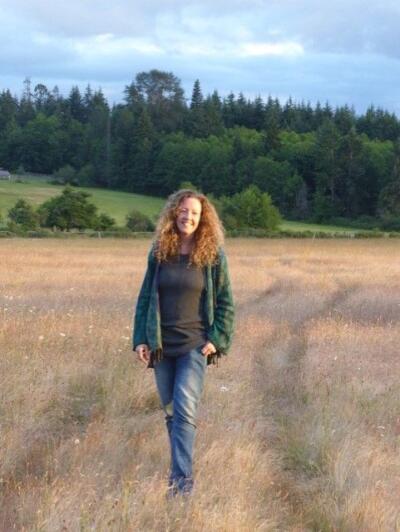1540 Small words, magic bees
Mad Honey
by Katie Welch
Hamilton, ON: Wolsak & Wynn, 2022
$22.00 / 9781989496527
Reviewed by Jessica Poon
*
 I have always found magic realism to be a mildly confusing term and no Googling will assuage this befuddlement. Is it simply literature with elements of sci-fi or miscellaneous otherworldliness that refuses to be genre fiction? With categorization, necessitated by a Linnaean desire for clarification in the form of codification, comes a different kind of confusion. If I had to say, I would define magic realism as where: weird, possibly mystical shit happens in an otherwise ostensibly realistic setting. Like, for instance, a man losing sense of time because he’s “become bees.”
I have always found magic realism to be a mildly confusing term and no Googling will assuage this befuddlement. Is it simply literature with elements of sci-fi or miscellaneous otherworldliness that refuses to be genre fiction? With categorization, necessitated by a Linnaean desire for clarification in the form of codification, comes a different kind of confusion. If I had to say, I would define magic realism as where: weird, possibly mystical shit happens in an otherwise ostensibly realistic setting. Like, for instance, a man losing sense of time because he’s “become bees.”
In Mad Honey by Katie Welch, we have an interesting, ambitious premise and multiple subplots. Our characters: Melissa Makepeace, temporarily head of the farm while her mother, Jill, goes on the kind of enlightening wellness trip favoured by wealthy white women; Daphne, Melissa’s adopted sister who serves as a fatherless foil to Melissa; Joseph, a grumpy farm hand who used to be an “avuncular” figure to Melissa; and Beck, Melissa’s beekeeper and also her lover. When Beck disappears over the summer with only a cursory note, Melissa is heartbroken but still has a farm to oversee. Beck’s explanation for his disappearance? He became a bee colony. Is this magic realism? Maybe, but in any case, it’s delightfully zany and for the majority of the book, inexplicable, which must be why the characters spend so much talking about how Beck must surely be off his rocker.

Only Beck’s parents and a cantankerous beekeeping widow, Marjorie, believe Beck. Eurydice, Beck’s mother and a Cuban santera, “a medium between the mortal and the sacred,” doesn’t exactly epitomize credibility to the primarily white ensemble. Beck’s father, Matthew, insists on Western medicine, reaching out to Max, his arrogant, newly divorced, bike-loving doctor friend from long ago; however, when physical exams are all cleared, Matthew concludes that Beck probably was a bee. Although I appreciate that nuance is important for even minor characters, I felt there was entirely too much attention spent on Max, who ends up being inadvertently pivotal to the unresolved disappearance of Melissa’s father.
The question, though, is not whether Beck was a bee or not — there are only believers and nonbelievers within the book. The real question is: why did Beck stop being a bee? (And, more technical questions: where was Beck’s corporeal human body while he was a bee? In hibernation?) Rest assured, the book, for all its multifaceted plots and questions, has answers.
As for Beck, he seems, understandably, to want to remain in the “real” world with Melissa and the farm, though it would perhaps be interesting if he was ambivalent about which world he wanted to stay in, rather than resolutely longing for conventional reality. For a person unusually attuned and fixated with bees, his desire for a hygienic sanity is pretty banal. But, then: banal does not have to be pejorative and who among us, when it comes down to it, is not fundamentally banal?
Beck and Melissa’s relationship has more frustration than frisson. For instance, what catalyzes their sexual relationship but Beck, unsolicitedly appearing naked in Melissa’s bed? (The exact line: “One morning he slipped uninvited into her bed.”) Unsolicited, yes. Welcome? Apparently, also, yes. On the one hand, it did remind me of a scene in Prep by Curtis Sittenfeld, where Lee’s long desired love object, disrupts her sleep by asking — while clothed, albeit drunk—if he can sleep in her bed. On the other hand, all we get is one throwaway mention that Melissa always found Beck loins-igniting (my terrible phrase, not the author’s). It feels more like these two characters have to be attracted to each other, for the sake of the book, rather than them actually being attracted. Occasionally, we get glimpses of what Walsh’s erotica writing might be like: “He drizzled honey on Melissa’s naked body, amber beads along her clavicles, a sticky line from navel to pubic bone, and then licked her clean.”
I’ve had many older white men suggest that I read George Orwell’s rules of writing — whether it was because they thought I specifically would benefit, or because they thought it was essential reading for everyone, I’m not sure. I remember initially being impressed with Orwell’s conviction. One of his most famous screeds is “Never use a long word where a short one will do.” Who decided that concision near universally reigns supreme over a gorgeously polysyllabic word? Isn’t that like saying sweatpants always win? Shorter and easier is not always better. It’s okay to be uncomfortable and reach for a dictionary or God forbid, a thesaurus. David Foster Wallace liked pointing out what a small word big was and how ugly the word pulchritude was (he still used the word, though). Theodor Adorno points out that the desirability of concision did not originate from some skyward, puritanical writing ideals but rather, from the marketplace, i.e., publishing industry. Somewhere along the way, writing ideals decided to co-opt concision as a True, Unassailable Value, conveniently forgetting the origins of concision from the sticky fingers of capitalism. All that to say, I have a historical resistance to the largely unquestioned notion that concision is queen.

But sometimes I come across a sentence like this one: “Joseph’s obdurate refusal fuelled Melissa’s pertinacious insistence.” And I think, maybe that’s what Orwell was talking about. Orwell had to write in the imperative tense of forbidding unequivocal advice: he had to sound like he knew what he was talking about. I can see that “pertinacious insistence” would, for the sibilance alone, be darling. And I think “obdurate” is a fine word, though, given that Joseph is reliably one-dimensional, we don’t need further detail, and certainly not when we already have the sibilant “pertinacious insistence.” But to fixate on one clunker of a sentence is a little bit like zooming in on someone’s pores in classroom lighting — it’s unfair and not wholly representative. Here’s a good simile: “ … he saw the hood of Charlie’s truck bounce … , like a demented laughing clown mouth.”
There are pleasures; there is suspense. Although the prose may occasionally be weighted with continuously telling us the colours of probably insignificant objects, the scope of the ambition — multiple plots, flashbacks, shifting perspectives, and overall accessibility reveal a skilled deliberation; it is never difficult to turn the pages. In other words: when you read this book, you want to know what the fuck is going on, and why the fuck it’s going on.
Another author would have taken hundreds of more pages, though it is worth noting this is a novel with curiously wide margins and manages to be sub 300 pages. Plus, we get lots of fun-fact nuggets about bees. Even if you’re perennially terrified and/ or allergic to bees, there’s no denying how damn impressive they are. I also appreciated the ecological crisis being acknowledged, which is inevitable when it comes to bees.
If I sound overly critical, it’s coming from a place of thwarted hopes because, certainly, Mad Honey is an aptly titled novel with admirable ambition: a good dose of magic realism (by my unwieldy, slippery definition, not James Wood’s); interracial relationships (there are differences highlighted, but not much poignancy); the beginnings of an ecological conversation; and elements of mystery that benefit from the third person limited shifting perspective.
After I made a fairly scathing analysis of “Time and Distance Overcome” by Eula Biss, the poet, Canisia Lubrin, reminded me that “There is value in learning from a thing that makes an attempt to see the world more fully, even, and especially, when it fails. That lesson, I believe, is one that needs to be more widely lauded. It is easy to critique. More difficult is the critique that can hold a place for what failure teaches/ reveals when it results from attempts that are, in the main, largely difficult.”
*

Originally from East Vancouver, Jessica Poon is a writer, former line cook, and a pianist of dubious merit living in Toronto. She is currently an MFA candidate in Creative Writing at the University of Guelph. Editor’s note: Jessica Poon has recently reviewed books by Megan Gail Coles, Ayesha Chaudhry, Gillian Wigmore, Meichi Ng, Alex Leslie, and Zsuzsi Gartner.
*
The British Columbia Review
Publisher and Editor: Richard Mackie
Formerly The Ormsby Review, The British Columbia Review is an on-line journal service for BC writers and readers. The Advisory Board consists of Jean Barman, Wade Davis, Robin Fisher, Cole Harris, Hugh Johnston, Kathy Mezei, Patricia Roy, Maria Tippett, and Graeme Wynn. Provincial Government Patron (since September 2018): Creative BC. Honorary Patron: Yosef Wosk. Scholarly Patron: SFU Graduate Liberal Studies.
“Only connect.” – E.M. Forster
11 comments on “1540 Small words, magic bees”
Surprised that Richard would publish this pedantic, gross review. All that pseudo-intellectualism and then profanity. I loved the novel, despite its overuse of metaphors and adjectives in the first half. It was a real page turner that thankfully did not become magic realism like what Gail Anderson-Dargatz writes. Instead of writing your review to make you look impressive, why don’t you try to write something that actually describes the book in a way people would appreciate.
Huh. I just finished the book myself a few minutes ago and I thought this review was pretty accurate and not particularly negative. I enjoyed the book while recognizing many of the flaws this reviewer points out — and I also appreciated all the “fun-fact nuggets about bees” the book contains. Given that Mad Honey includes its own bits of profanity, it’s odd to find the occasional “fuck” and “damn” in a review offensive. Mad Honey is a fine debut novel, and odds are Katie Welch’s next book will be better — possibly as a result of caring, honest reviews like this one by Jessica Poon.